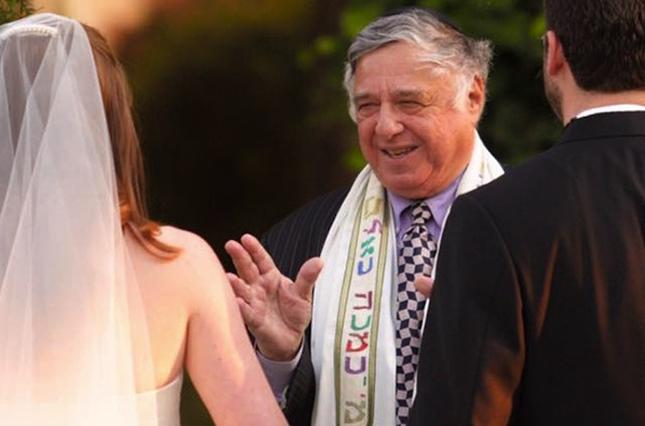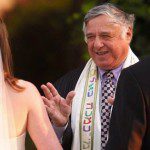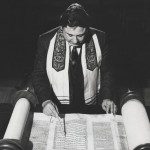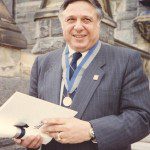Georgetown’s Rabbi White, 83, Remembered for Bridging Faiths
By • October 15, 2015 0 1129

Georgetown University’s Rabbi Harold White, the first full-time rabbi at a U.S. Catholic university and highly regarded for his interreligious teachings, died Aug. 31 of complications from a stroke at the age of 83.
In 1968, White began as the school’s Jewish chaplain not so much for the few Jewish students at the time but for all students—to promote understanding between Judaism and Christianity and beyond.
A Freedom Rider in the civil rights movement, White many years later helped to found the Program for Jewish Civilization in 2004. He retired in 2010.
The university will hold a memorial service for White 10:30 a.m., Sunday, Sept. 20, in Gaston Hall.
“Rabbi White’s devotion to our shared values and our mission as a community was unparalleled,” said the university’s president John DeGioia. “His leadership and vision in creating opportunities for dialogue strengthened our community and helped build the ethos of engagement that characterizes our campus ministry today.”
The following are portions of a news release by Georgetown University that tells the story of White’s life and influence.
EMBRACING DIFFERENCES
The rabbi, whom students called “Rabs,” also co-taught a popular course in the theology department with Rev. Dennis McManus, a Catholic priest and visiting associate professor at the School of Foreign Service, and Georgetown’s Imam Yahya Hendi on the many similarities as well as differences among the Abrahamic faiths.
“The goal of interreligious dialogue,” White once said, “is not to just look for similarities, but to see the differences and be able to embrace the differences.”
Hendi shares a “first” with White as the first Muslim chaplain hired by a Catholic university. “The rabbi was a close friend and an amazing confidant,” Hendi said. “He taught with integrity, and love for the truth.”
STUDENTS’ BEST SELVES
McManus had been with White recently – they had traveled together to Poland this past summer to visit the Jan Karski Educational Foundation’s sister organization in Warsaw. (Karski, the Polish World War II resistance movement fighter who taught at Georgetown for four decades until his death in 2000, made the first reports of Nazi atrocities to the Polish government and Western allies.)
“Rabbi White had a unique gift as a teacher,” McManus said. “He could draw out what was best in his students even before they asked him a question. The result was always the same – as they became their best selves at his invitation, they could only ask their best questions. Every professor envied this gift.”
HALLELUJAH, JESUIT SHABBAT
A tireless promoter of interreligious understanding, Rabbi White also started new traditions at Georgetown, including Hallelujah Shabbat, a traditional Shabbat service every January that invites choirs – including gospel choirs – to participate. And during Jesuit Heritage Week every February, he created a Jesuit Shabbat and invited Jesuits to share their personal religious journeys as he shared his own.
“Georgetown is unique,” White said in a Georgetown Witness to History video in 2008. “The leadership of this university are people who proudly affirm and assert their religious identity and that is what makes Georgetown so very, very special.”
ENCYCLOPEDIC KNOWLEDGE
Many Georgetown faculty members noted White’s encyclopedic knowledge of Judaism.
“Everything in the immense universe of Jewish civilization interested Rabbi White – from Kabbalah to the Jews of China, from Rabbinic Midrash to the more radical theologies that developed in the wake of the Holocaust, from the writings of Moses Maimonides to the philosophy of Martin Buber,” said Jacques Berlinerblau, director of the School of Foreign Service’s Program for Jewish Civilization. “In particular, Rabbi White was greatly influenced by the teachings of his mentor, Rabbi Mordecai Kaplan. He brought all of these influences to bear in his tireless work with generations of Georgetown students.”
FRIEND, TEACHER, RABBI, THERAPIST
White performed countless interfaith marriages throughout the Washington area, including many Georgetown students but also many who simply sought him out. The rabbi served as spiritual advisor to the Interfaith Families Project of Greater Washington, D.C., Area. In his “spare time,” he served as scholar-in-residence at Holy Cross Abbey in Berryville, Virginia, and at Mercersburg Academy in Pennsylvania.
Israel Klein posted a tribute on Facebook. “A handful of folks were able to visit the rabbi between his stroke and hospice care,” Klein wrote. “He spent his last days in a beautiful hospice facility on the Long Island Sound in Connecticut. He was surrounded by friends and family and natural beauty. … Emerson said, ‘It is not length of life, but depth of life.’ Rabbi had both. He’s a person we were blessed to know and love.”
INTERFAITH MARRIAGES
Erik Smulson, Georgetown’s vice president for public affairs, first met White as a child. The rabbi was a friend of his father, Mark Smulson, a longtime research scientist and professor of biochemistry at the university’s medical school who passed away four years ago.
“Rabbi White served generations of Hoyas,” Smulson said. “The High Holidays services that he created were the only free services in the city.” Smulson recalls that Gaston Hall, where the services were held, was full of Jewish students, members of Congress and interns from Capitol Hill who had nowhere else to go.
While a student at Georgetown, Smulson fell in love with Jennifer Beard, a Catholic. Because both students valued their religious backgrounds, they asked White and a Catholic priest to marry them.
“For many years, he was the only rabbi willing to perform interfaith marriages,” said Smulson, now a father of three. “He met with me and Jen as we prepared for the wedding, and talked to us about love and respect and faith.”
A GREAT LIGHT
The free High Holiday services continue under Georgetown’s Rabbi Rachel Gartner.
“A great light has gone out in the world,” Gartner said at a Jewish prayer service at Georgetown in White’s honor. “We knew Rabbi White by his smile and his work, his friendship and his leadership, his life and his vision.” She said his Hebrew name meant “life” and “peace.”
“He really pursued peace and understanding really every day of his life,” Gartner added. “We were blessed to have him in our presence, and I know that we’ll carry his light on in our different ways and in all the work that we do.”
Georgetown will announce a larger memorial service in the near future.
STUDENT OF HESCHEL, BUBER
Born in 1932 in Hartford, Connecticut, White received his bachelor’s degree in philosophy from Wesleyan University, his rabbinical degree from the Jewish Theological Seminary and a certificate in pastoral counseling from Bellevue Hospital in New York City.
Before Georgetown, he was rabbi of Beth Israel Congregation in Ann Arbor, Michigan, as well as Jewish chaplain at St. Joseph Mercy Hospital and American University’s rabbi. He served as a U.S. Navy Chaplain at Parris Island, South Carolina, and with the 7th Fleet in the Pacific.
At the seminary, he studied under the well-known Polish-born American Rabbi Abraham Joshua Heschel, considered one of the leading Jewish philosophers of the 20th century, as well as equally revered Jewish philosopher Martin Buber and Rabbi Mordecai Kaplan.
Before he died, White asked that all donations in his name be made to the Program for Jewish Civilization.
- Rabbi Harold White officiating at a wedding. | Georgetown University




